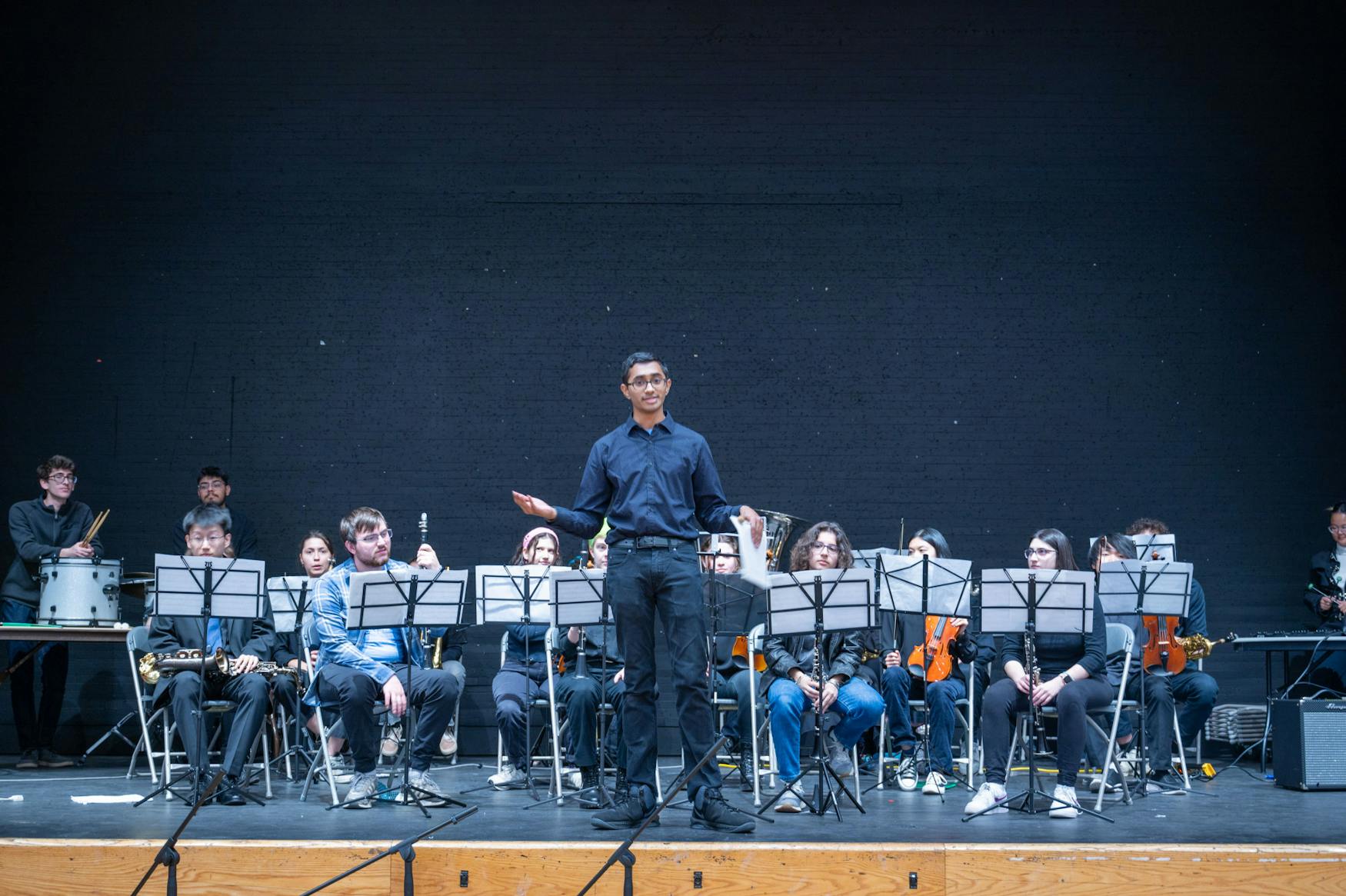Bandapalooza’s debut appearance: An afternoon of song and dance
To start off the new month, Brandeis’ most musically talented joined forces to present Bandapalooza on Nov. 3. Top Score, Music and Dance Band, Klezmer and the Guitar and Bass Club launched the event this year for the purpose of bringing recognition to student clubs, bands and musicians. The passion of the performers and organizers to connect with new audiences spanned Levin Ballroom. On one side, the Student Music Committee and WBRS shared a table, giving a glimpse into the everyday capacity of musicians on campus, and on the other, performers lined the walls awaiting their chance to present.
Already on stage, Top Score, a club dedicated to playing the soundtracks to your favorite movies, television shows, video games and musicals began the show. Their first song, while not exactly from visual media, was a Beatles medley of “I Want to Hold Your Hand,” “And I Love Her” and “The Twist.” The group was masterfully cohesive, breathing modern life into the well-known songs. Even still, the intimacy of the original music remained culminating with the excitement of “The Twist,” inspiring the audience to dance in their seats. This was followed by the “Pokémon” television series theme tune where, with the scope of instruments showcased in Top Score, a complexity was awakened in this childhood classic.
Next up, the imaginatively named Unprotected Sax hopped on stage. This tongue-in-cheek quartet of saxophonists told us to “prepare our brass” as their smooth melodies began. The variety of saxophones produced symphonic qualities with a distinctly 1970s jazz energy. They embodied the joy of seeing live performances while showcasing the specialty of each type of musician represented. The lowest tenor saxophonist, in particular, carried a strong beat for the effortless refrains of the higher tenor artists. Overall, the musical stylings of Unprotected Sax perfectly aligned with what one expects of a great saxophone performance.
With a myriad of instruments behind them, Klezmer introduced their goal of returning to the roots of Jewish folk music. To accomplish this, they performed with no sheet music, welcoming improvisation and community among band members. Additionally, they encouraged dancing, leading to a line of people bobbing up and down with the start of the “Table Song.” This was the first of three pieces which followed the narrative journey of a wedding. This first song was the perfect build-up to the widely recognizable “Chair Song” or “Hava Nagila,” which prompted the dancers to form a circle for the traditional Hora dance. Finally, Klezmer closed with the “Golden Wedding Song,” a triumph of musicality as instruments from the trombone, violin, saxophone, clarinet and percussion handed off solo moments displaying performers’ talent.
Mckinley Grips commanded the stage next with their rock and metal inspirations taking full aim at the audience. The five member student band proved themselves rock stars with impressive guitar riffs and the call for a mosh pit. Further, the group showed appreciation for the rock genre executing classic songs with the utmost respect while delivering a hair-raising metal finish.
The playful Brain Cells for Rent kicked off their time with an absurdist introduction of banter between band members before entering into their first piece. The comedy continued with the next song needing no introduction for the audience, but guitarist Matan Schwartz ’27 found himself surprised to hear the tune. Nonetheless, he came in perfectly on time for a wonderful rendition of “Hotel California.” In total, the general style of Brain Cells for Rent seemed to be aligned with indie revival by channeling the 1970s and 1980s for a stunningly groovy time.
Solo artist Rae Nico ’25, who specializes in ukulele folk, came to perform two original pieces off their new album “The Testimony.” The songs “Dollhouse” and “Paperback” captured a sorrowful teenage spirit bringing relatable commonalities of growing up to the forefront. The professional qualities of Nico were apparent in their fully fleshed vocals and instrumental abilities which gave depth to the songs.
The last group to perform was the Brandeis MAD Band, a collective of students energized to make music. They lined the stage in matching sparkly blue hats and club merchandise to produce a raucous finale to the afternoon. Their music was pure and guttural, not unlike big jazz bands of the 1940s. They expertly transferred this historic feeling into modern music with their version of Benson Boone’s “Beautiful Things.” Overall, MAD Band’s style of hit-you-in-the-face fun lit up the audience, ending the afternoon on a high note.
Next year, we should certainly expect a return of Bandapalooza to Brandeis, possibly with new performers and bands. Until then, it is tremendous to recognize spaces where students come together, uplifting the campus’ arts community.
— The Justice Editor Bryan Wolfe ’27 is a member of Top Score and did not contribute to or edit this article.



Please note All comments are eligible for publication in The Justice.